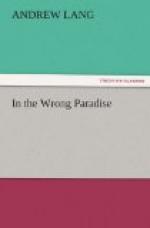THE HOUSE OF STRANGE STORIES.
The House of Strange Stories, as I prefer to call it (though it is not known by that name in the county), seems the very place for a ghost. Yet, though so many peoples have dwelt upon its site and in its chambers, though the ancient Elizabethan oak, and all the queer tables and chairs that a dozen generations have bequeathed, might well be tenanted by ancestral spirits, and disturbed by rappings, it is a curious fact that there is not a ghost in the House of Strange Stories. On my earliest visit to this mansion, I was disturbed, I own, by a not unpleasing expectancy. There must, one argued, be a shadowy lady in green in the bedroom, or, just as one was falling asleep, the spectre of a Jesuit would creep out of the priest’s hole, where he was starved to death in the “spacious times of great Elizabeth,” and would search for a morsel of bread. The priest was usually starved out, sentinels being placed in all the rooms and passages, till at last hunger and want of air would drive the wretched man to give himself up, for the sake of change of wretchedness. Then perhaps he was hanged, or he “died in our hands,” as one of Elizabeth’s officers euphemistically put it, when the Jesuit was tortured to death in the Tower. No “House of Seven Gables” across the Atlantic can have quite such memories as these, yet, oddly enough, I do not know of more than one ghost of a Jesuit in all England. He appeared to a learned doctor in a library, and the learned doctor described the phantom, not long ago, in the Athenaeum.
“Does the priest of your ‘priest-hole’ walk?” I asked the squire one winter evening in the House of Strange Stories.
Darkness had come to the rescue of the pheasants about four in the afternoon, and all of us, men and women, were sitting at afternoon tea in the firelit study, drowsily watching the flicker of the flame on the black panelling. The characters will introduce themselves, as they take part in the conversation.
“No,” said the squire, “even the priest does not walk. Somehow very few of the Jesuits have left ghosts in country houses. They are just the customers you would expect to ‘walk,’ but they don’t.”




